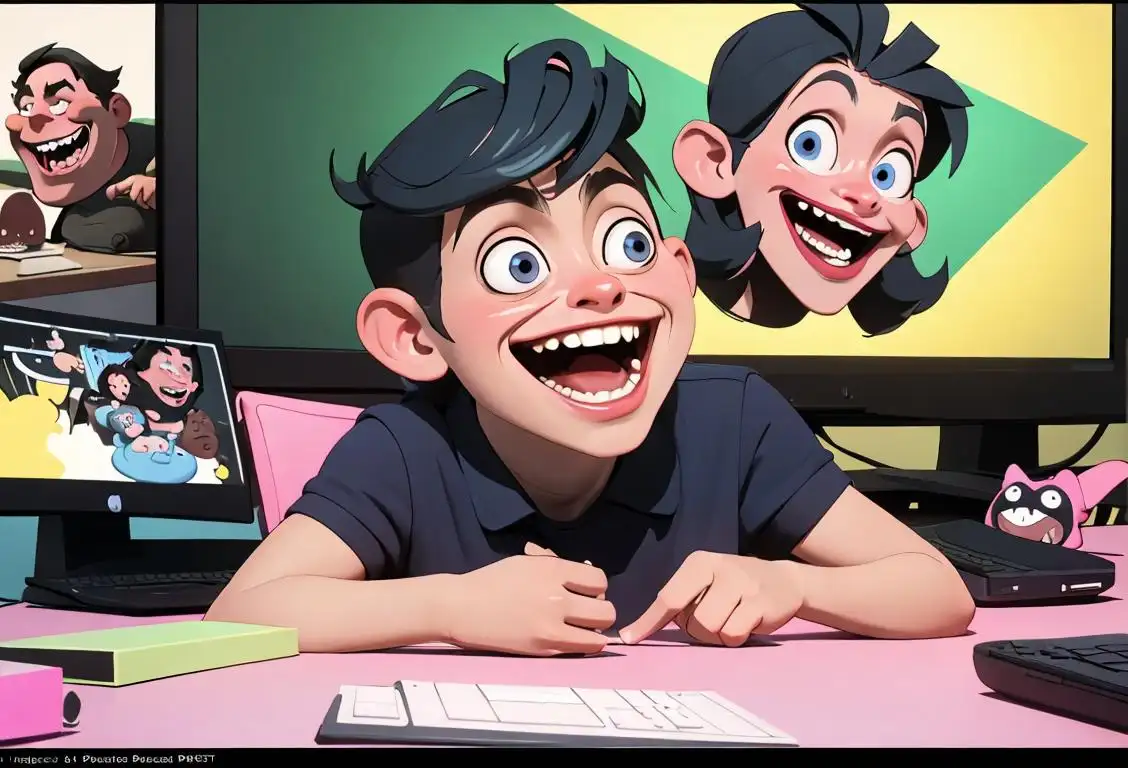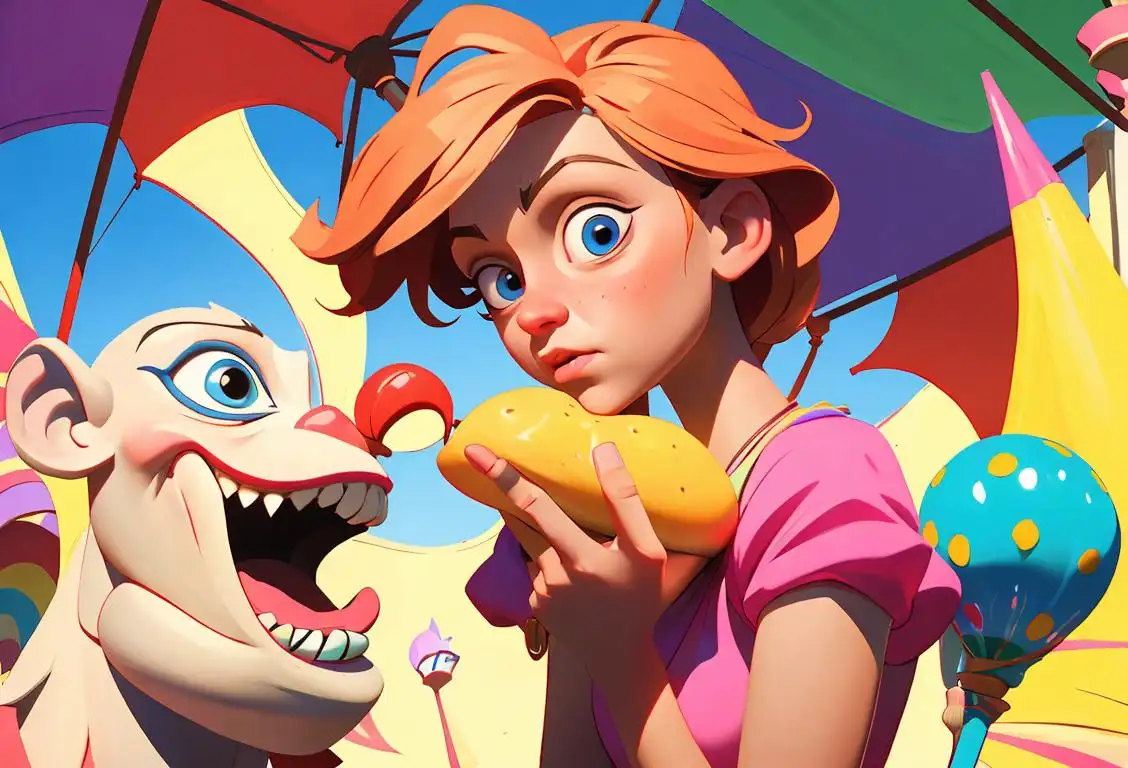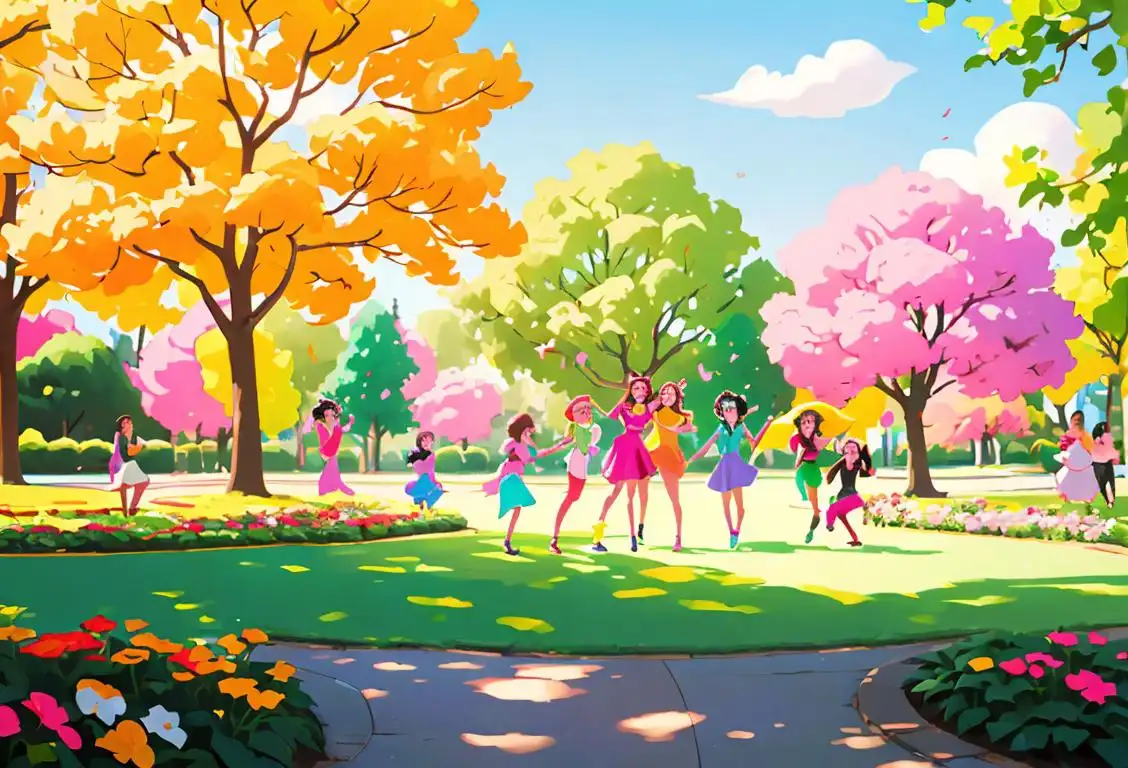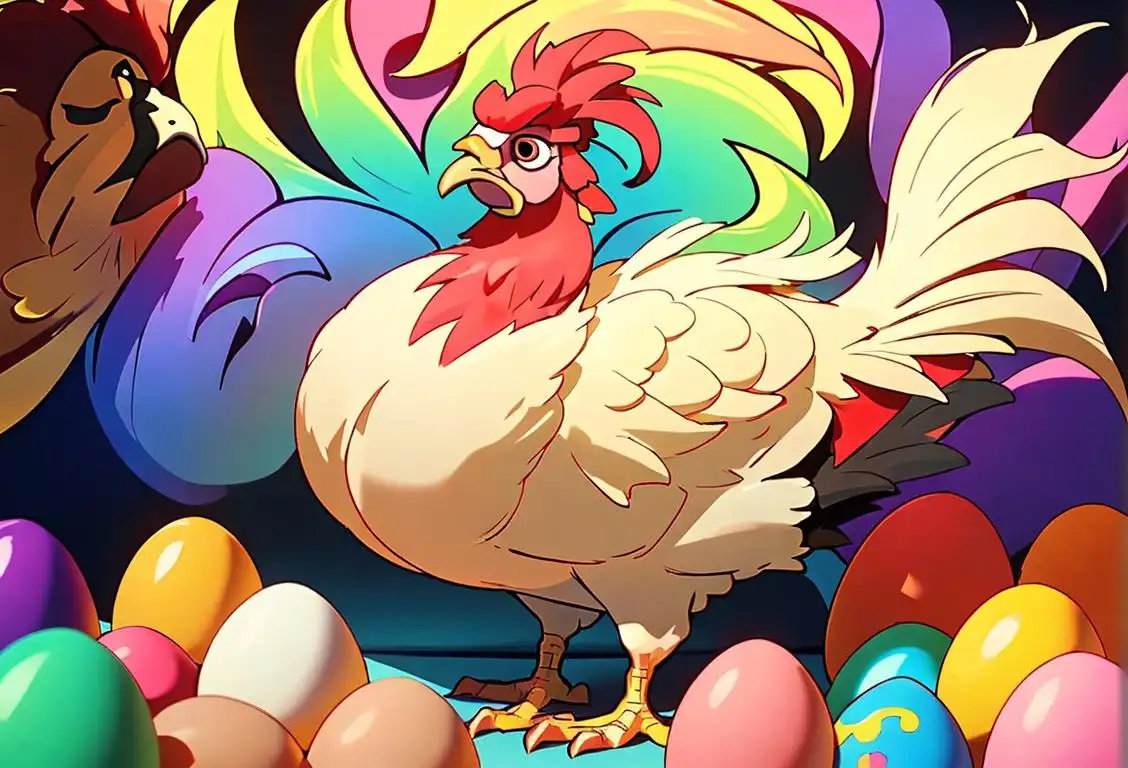National Trolling Day

Are you ready to dive into the wacky world of National Trolling Day? Strap in because we're about to take a hilarious journey into the art of online mischief and making people laugh. Get ready to laugh your socks off and maybe even learn a thing or two about the wild and wonderful world of trolling!
When is Trolling Day?
It's national trolling day on the 23rd March.
The Origins of National Trolling Day
National Trolling Day is a celebration of all things mischievous and funny. It originated on 23rd March 2015 when the internet exploded with mentions of trolls and their hilarious antics. The online community couldn't resist sharing their favorite trolling stories, from epic pranks to clever comebacks. Since then, the internet has embraced this day as a time to let loose and embrace their inner trolls.
The Art of Trolling
Trolling is the art of intentionally provoking or teasing others online for comedic effect. It's not about being mean-spirited or hurtful, but rather about creating laughter and entertainment. From funny forum posts to clever comments, trolling can take many forms. It's all about finding the perfect balance of wit and humor to bring a smile to someone's face.
Notable Trolling Moments
Throughout history, the internet has witnessed some legendary trolling moments. One famous example is the Rickroll, where unsuspecting internet users are tricked into clicking a link that leads them to Rick Astley's music video for 'Never Gonna Give You Up.' It's a classic example of a harmless and hilarious prank that still continues to surprise people today.
The Troll's Code
While trolling can be a lot of fun, it's important to remember that there are boundaries. The best trolls know how to push the limits without crossing the line into harassment or cruelty. The Troll's Code, if you will, encourages humor, creativity, and lightheartedness. So next time you decide to unleash your inner troll, remember to keep it fun and respectful.
History behind the term 'Trolling'
1990
Emergence of Usenet Groups
In 1990, the term 'trolling' originated in the context of Usenet discussion groups. Usenet was a popular online platform for exchanging messages and discussing various topics. At this time, trolling referred to intentionally posting provocative or off-topic messages to elicit emotional responses from other users.
1990
The Birth of the Term 'Trolling'
The term 'trolling' is believed to have originated in the early 1990s on internet discussion boards. It refers to the act of deliberately posting provocative or inflammatory messages with the intention of eliciting an emotional response from other users. The term is derived from the fishing technique of trolling, where a baited line is dragged behind a moving boat, enticing fish to bite.
1990
The Birth of Internet Trolling
In the early 1990s, the term 'trolling' emerged on the internet. It was originally used to describe the act of deliberately posting provocative or inflammatory messages, with the intention of provoking an emotional response or disrupting online discussions. This behavior was often seen in online forums and message boards.
1970s
Origins of the Term
The term 'trolling' originated in the early days of the internet, specifically on early message boards and bulletin board systems (BBS) during the 1970s. At this time, 'trolling' referred to the act of deliberately posting inflammatory or provocative messages to provoke a reaction from other users. The term derived from the fishing technique of trolling, where a baited line or net is slowly dragged through the water to catch fish.
1990
The Birth of Usenet Trolling
The term 'trolling' originated in the early 1990s on Usenet, an online discussion system that predates the modern internet. It referred to the act of deliberately posting inflammatory or off-topic messages to provoke a reaction from other users. These trolls would often take on controversial stances or adopt a confrontational tone to disrupt the normal flow of conversation.
1980
The Emergence of 'Troll'
The term 'troll' first emerged in the early 1980s within online communities like Usenet and bulletin board systems (BBS). It referred to an individual who intentionally made disruptive or inflammatory comments to provoke emotional responses from other users. This use of 'troll' draws inspiration from the mythological creature known for its mischievous and antagonistic behavior.
1972
The Birth of ARPANET
In 1972, the Advanced Research Projects Agency Network (ARPANET) was established, laying the foundation for the modern internet. ARPANET was widely used by scientists and researchers, creating a platform for communication and information exchange.
1990
The Emergence of the Term
The term 'trolling' originated in the early 1990s in the alt.folklore.urban newsgroup. It was used to describe a specific type of online behavior where individuals would intentionally provoke and harass others for their own amusement. The term was inspired by the fishing technique known as 'trolling,' which involves trailing bait behind a moving boat to catch fish. Similarly, online trolls would dangle bait in the form of provocative comments to elicit strong emotional responses from others.
1980
Early origins in Usenet
In the early 1980s, when the Internet was still in its infancy, the term 'trolling' began to emerge in the online community. It was first used on Usenet, a popular worldwide distributed discussion system. 'Trolling' at this time referred to the act of intentionally posting provocative or off-topic messages to elicit emotional responses from other users.
2003
Trolling Evolves with Imageboards
In 2003, internet forums known as imageboards gained popularity, particularly with the launch of the notorious 4chan. Imageboards provided a platform for anonymous users to share images and engage in discussions. Trolling on imageboards took on a new form, with users deliberately posting shocking, offensive, or misleading images and comments to elicit strong reactions from others.
1990s
Usenet Culture
Trolling gained more prominence in the 1990s with the rise of Usenet, a global distributed discussion system. Usenet saw a significant increase in trolling activities, with users intentionally disrupting discussions and engaging in flame wars. This period marked the expansion of trolling beyond a mere provocation tactic and into a more disruptive form aimed at derailing conversations and inciting anger.
1993
The Internet Meme
In 1993, the term 'trolling' gained more widespread attention when it was associated with a specific type of Internet meme. The meme involved users posting inflammatory or off-topic remarks on online forums, with the intention of derailing discussions and inciting others. This form of trolling became known as 'flaming' or 'flame wars,' and it often led to heated arguments and personal attacks among participants.
1990
The fishing metaphor
The term 'trolling' as an online behavior gained popularity in the 1990s. It was during this time that the fishing metaphor became associated with the term. Just like a fisherman who trolls a fishing line through the water, online trolls would cast out their controversial statements or bait in discussion forums, hoping to hook unsuspecting users.
1990s
Usenet and Early Trolling Culture
During the 1990s, the concept of trolling became more prevalent on Usenet, a popular online discussion system at the time. Trolls would often engage in prolonged arguments and intentionally derail discussions by posting off-topic or outrageous messages. Usenet communities developed a culture of recognizing and responding to trolls, sometimes even incorporating humor and mockery to expose their tactics.
1980
Netiquette Emerges
As more people joined online communities and bulletin board systems in the 1980s, the need for online etiquette, or 'netiquette,' became apparent. Netiquette guidelines were created to promote respectful and constructive online behavior.
2003
The Art of Trolling
By the early 2000s, trolling had evolved into a more sophisticated art form. Trolls began using humor, satire, and sarcasm to bait and provoke others, often taking advantage of the anonymity provided by the internet. Memes and trolling became intertwined, leading to the creation of internet communities dedicated to the practice of trolling.
1993
The Fishing Analogy
Around 1993, the fishing analogy of trolling started gaining traction. Trolling was compared to fishing by dropping a baited line into the online community and waiting for people to react. This metaphor helped explain the purposeful and often mischievous nature of trolling behavior.
1990
Usage in Internet Relay Chat (IRC)
Throughout the 1990s, the term 'troll' gained popularity with the rise of Internet Relay Chat (IRC). It described users who engaged in malicious or annoying behavior to disrupt conversations and provoke reactions. Trolling soon became an unfortunate aspect of early internet culture.
2000
Evolution of Trolling on Internet Forums
As internet forums gained popularity, trolling continued to evolve. Trolls began to purposefully disrupt conversations, manipulate emotions, or spread misinformation for their own amusement or to provoke a reaction. Forum moderators and users devised various strategies to combat trolling, such as banning users, implementing content filters, or creating separate spaces for serious discussion.
1990
The Birth of Usenet
In 1990, Usenet, a global distributed discussion system, played a significant role in the evolution of trolling. Usenet allowed individuals to post messages in various newsgroups, fostering diverse online conversations.
2000s
Evolution on Internet Forums
During the 2000s, trolling continued to evolve with the growth of internet forums. Trolls on forums would often post off-topic or nonsensical messages, engage in excessive arguing, or deliberately spread false information to confuse or frustrate other users. This era saw the emergence of 'troll culture,' where some individuals actively embraced trolling as a form of online entertainment, seeking attention and amusement through their disruptive behavior.
2008
Trolling Merges with Memes
By 2008, trolling had become intertwined with internet memes. Memes are humorous or viral content shared and spread rapidly online. Trolls started creating and circulating memes specifically designed to provoke and confuse others. These memes often played on popular culture references or used absurdist humor, making them highly shareable and disruptive.
2000
4chan and Anonymous
The early 2000s witnessed the rise of the notorious imageboard website, 4chan, as well as the emergence of the 'Anonymous' movement. 4chan became a breeding ground for trolls, drawing attention to the term and its association with disruptive online behavior. The 'Anonymous' movement, characterized by its use of controversial and sometimes offensive tactics, further contributed to the popularization of trolling.
2003
Coined as 'Trolling' in the Modern Sense
It wasn't until 2003 that the term 'trolling' was solidified with its modern definition. The website 'trolling.motd.org' was launched, providing a central location for users to showcase trolling techniques and discuss their exploits. This solidification helped establish trolling as a distinct phenomenon and term within internet culture.
1999
Online Forum Culture
By 1999, online forums had gained popularity, and trolling became more prevalent. Trolls sought attention by disrupting conversations, spreading misinformation, or engaging in personal attacks. This behavior was primarily driven by a desire to provoke emotional reactions and stir up conflict within the community.
2008
Mainstream Recognition
In 2008, trolling started gaining mainstream recognition. Time magazine included 'trolling' in its annual list of the 10 Most Annoying Phrases. This recognition shed light on the impact and prevalence of trolling in online culture.
2003
The Evolution of Trolling
As the Internet and social media platforms grew in popularity in the early 2000s, the term 'trolling' expanded to encompass a wider range of behaviors. Trolls began to target individuals or communities with offensive or provocative content, often fueled by anonymity provided by online platforms. This form of trolling aimed to disrupt online communities and provoke emotional reactions, sometimes even leading to real-world consequences for the victims.
2012
Trolling as Political Weapon
The 2012 U.S. presidential election marked a turning point for trolling as it became a political weapon. Trolls targeted political figures, using social media platforms to spread misinformation, incite anger, and disrupt political discussions. Trolling tactics were employed by supporters and opponents alike, demonstrating the power of trolling in shaping public opinion.
2003
The Emergence of Imageboard Culture and Memes
Around 2003, imageboards like 4chan introduced a new dimension to trolling. Memes, humorous images, catchphrases, and inside jokes became popular tools for trolls to spread their influence and amuse themselves. Trolling on imageboards often involved intentionally creating controversial content or orchestrating elaborate hoaxes, engaging in a form of digital performance art.
2007
The LOLcats Era
In 2007, a new wave of trolling emerged with the rise of image-based memes. 'LOLcats,' a popular meme featuring humorous captions paired with pictures of cats, became a breeding ground for trolling. Trolls would manipulate these images and captions to create absurd or offensive content, attracting a wide range of reactions from the audience. This marked a shift in trolling culture, where humor and absurdity became prevalent tactics used by trolls to provoke reactions.
2010
Mainstream Awareness and Internet Trolls
Around 2010, the term 'internet troll' began to enter mainstream consciousness. Media outlets started reporting on the phenomenon, shedding light on the disruptive behavior of online trolls. The term 'trolling' expanded beyond its original meaning and encompassed any form of deliberately antagonistic or offensive online behavior, even when not associated with Usenet or imageboards.
2010s
Mainstream Awareness
Towards the 2010s, trolling began to receive more mainstream attention. High-profile incidents involving trolling, such as targeted harassment campaigns and internet hoaxes, brought the term into the public consciousness. Media outlets started to cover the phenomenon extensively, shedding light on the negative impact trolling can have on individuals and communities. As a result, internet platforms and social media sites started implementing stricter policies and moderation practices to curb trolling behavior.
1993
Trolling Emerges
The term 'trolling' started to gain recognition in the early 1990s within the Usenet community. It was used to describe deliberately disruptive behavior, such as posting controversial or antagonistic messages to provoke emotional responses.
2003
4chan and Anonymous Trolling
In 2003, the imageboard website 4chan was launched, becoming a hub for internet culture and anonymous trolling. Users on 4chan engaged in highly provocative and often offensive behavior for the sake of amusement. This platform contributed significantly to the development of trolling as an internet subculture.
2010
Mainstream recognition and cultural impact
By the 2010s, trolling had become a mainstream term, recognized and understood by internet users worldwide. It had evolved beyond its original meaning and was now used to describe a variety of online behaviors aimed at provoking and misleading others. Trolling had also seeped into popular culture, with references in TV shows, movies, and even political discourse, highlighting its undeniably significant cultural impact.
2008
Mainstream Recognition and Expansion
By 2008, trolling had gained significant attention and recognition in mainstream media, featuring in articles, television shows, and even research studies. The expansion of social media platforms further amplified the prevalence of trolling, with individuals seeking attention and seeking to provoke reactions becoming increasingly common.
2008
Mainstream Awareness and Misuse
Around 2008, trolling began to gain mainstream attention as internet memes and pranks spread widely. However, this increased visibility also led to the term being misused and applied to any form of online harassment or incivility, diluting its original meaning.
2010
Positive Derivations: Concern Trolling and Hobby Trolling
As trolling continued to evolve, positive derivations emerged, such as 'concern trolling' and 'hobby trolling.' Concern trolling refers to individuals who pretend to be genuinely concerned while actually trying to undermine a cause or provoke disagreement. Hobby trolling, on the other hand, involves individuals who engage in trolling as a form of amusement, often using ironic or exaggerated statements.
Present
The Troll Culture and Internet Communities
In the present day, trolling has become prevalent across various online platforms, from social media to comment sections. While some trolls seek attention and entertainment through their disruptive actions, others engage in more harmful behaviors, such as cyberbullying or spreading disinformation. Internet communities have implemented various strategies to combat trolling, such as moderation, user blocking, and automated content filters.
2010
Trolling Goes Mainstream
By 2010, the term 'trolling' had become widely recognized outside of online communities. Media outlets and public figures started using the term to describe malicious or provocative behavior, both online and offline. This led to a heightened awareness of trolling as a social issue and prompted discussions around the impact of online harassment and the need for moderation in digital spaces. Trolling had evolved from a niche internet phenomenon to a prominent cultural term.
2000s-2010s
Trolling in the Internet Age
With the rise of social media and widespread internet access, trolling has become even more prevalent. Trolls can now target individuals, public figures, and organizations, often using pseudonymous accounts to hide their true identity. The impact of trolling varies from minor annoyance to severe harassment, with some cases even leading to real-world consequences.
2014
Gamergate Controversy
In 2014, a controversy known as Gamergate erupted, highlighting the darker side of trolling. It started as a debate about ethics in video game journalism but quickly devolved into targeted harassment and threats against women in the gaming industry. The Gamergate controversy brought mainstream attention to the harmful effects of trolling and sparked discussions about online harassment.
1999
Trolling Goes Mainstream
As the internet became more accessible and popularized through the late 1990s, trolling expanded beyond Usenet and infiltrated other online platforms such as chat rooms and forums. Trolling tactics ranged from harmless pranks to more malicious actions.
2021
Trolling on Social Media
Trolling has continued to evolve and flourish on social media platforms in recent years. With the rise of fake news and echo chambers, trolls have exploited these vulnerabilities. Trolling accounts and bots have been used to spread disinformation, sow discord, and manipulate public opinion, making it increasingly difficult to discern genuine online discussions from orchestrated trolling campaigns.
2003
Trolling Subculture
In 2003, the term 'troll' was adopted by online communities to describe individuals who engage in disruptive behavior for attention or personal amusement. The trolling subculture developed its own unique language, rituals, and codes of conduct.
Present
Influence on Online Culture
In the present, trolling remains a pervasive aspect of online culture. While some forms of trolling still involve harmless pranks and satire, others can have more serious consequences, such as cyberbullying or targeted harassment. The term 'trolling' continues to evolve alongside the ever-changing landscape of the internet.
Present
Trolling as a Widespread Phenomenon
Trolling is now a well-known and widely recognized phenomenon, deeply ingrained in online culture. It has become a significant challenge for online platforms to combat trolling while protecting freedom of speech. Understanding the history and motivations behind trolling helps guide discussions on how to foster healthier and more inclusive online communities.
2010
Trolling in Social Media
With the rise of social media platforms like Facebook and Twitter, trolling found new avenues for expression. Internet trolls gained attention for targeting public figures, promoting divisive content, and engaging in online harassment.
Did you know?
Did you know that the word 'troll' actually comes from Scandinavian folklore? In legend, trolls were mischievous creatures who loved to play pranks on humans. It seems fitting that the term carried over into the online world!Tagged
fun humor internet cultureFirst identified
23rd March 2015Most mentioned on
23rd March 2015Total mentions
30Other days
I Think Tf Not Day
Fckboy Day
False Equivalency Day
Outrage Column Per Day
Get Cucked Day
Ignore Stephanie Day
Black Dick Appreciation Day
Fuck Yolanda Day
Cock Worship Day
Trolling Day




